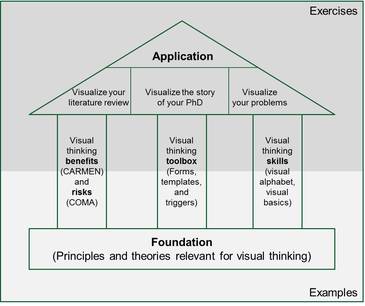Information détaillée concernant le cours
| Titre | Visual Thinking for Doctoral Researchers (421) |
| Dates | 21 October 2024 |
| Lang |
|
| Organisateur(s)/trice(s) | |
| Intervenant-e-s | Dr Sebastian Kernbach |
| Description | The overall aim of this workshop is to help participants enhance their thinking and communication skills through the use of visual thinking such as diagrams, knowledge maps or visual metaphors. Working on the dissertation or research papers can be frustrating at times. Sometimes it may be because we feel overloaded with ideas and thoughts (cognitively), or we may feel overwhelmed and not motivated (emotionally), or we feel disconnected from our supervisor or peers (socially). Visual thinking is a tool to help overcome those challenges and work more productively and enjoyable. This workshop will provide participants with the foundation of what visual thinking is and why it is beneficial for thinking and communication for individuals and groups. Based on these foundations participants will learn more about the benefits and risks of visual thinking. Participants will see different visual formats through examples (tree diagrams, empathy maps and many more) and acquire basic sketching skills to express themselves visually. (You don't have to be creative or good in the arts to be able to sketch!) Participants will apply what they have learned to visualize their literature review, research design, research proposal, story of their PhD or any other research project.
Workshop content: The following knowledge structure gives participants an overview of the content of the workshop. Based on foundations of visual thinking, participants will soon apply it to their own projects.
Learning outcomes: Workshop participants should have improved their skills and be capable of doing things in the following areas. Participants should... know
be able
approach
Method: The workshop is highly interactive as it is organized in input-sessions and break-out-sessions. The trainer will give short inputs, 30-45 minutes, and participants will work in multiple break-out-sessions on their current projects applying visual thinking techniques. These break-out-sessions are between 30-45 minutes and are either individual or in teams of two (visual sparring).
Preparatory Work: Participants will be asked to bring any relevant material of their current research project so that they can work with it during the workshop. This will enable participants to enhance their own projects during the workshop and is an important prerequisite for them to continue using visual thinking after the workshop.
Intended Audience: The workshop works well for all kinds of PhD candidates, beginners as well as those close to completion, and also from any discipline. In fact, a multidisciplinary participant group is very welcome since this gives great value to the visual sparring sessions.
|
| Lieu |
ONLINE! |
| Information | Date: Monday, 21st October 2024 Time: From 9:15 am to 5:15 pm Location: Online !
Trainer: Prof. Dr. Sebastian Kernbach is Assistant-Professor at the University of St. Gallen, a Visiting Fellow at Stanford University and Guest Professor at the African Doctoral Academy at Stellenbosch University . He is the founder of the Visual Collaboration Lab (vicola.org) and the Life Design Lab in Switzerland (www.lifedesignlab.ch). His activities in research, teaching and consulting focus on the role of visual thinking and design thinking to support individuals, teams and organizations in their thinking and communication efforts, in particular knowledge workers, such as researchers, lecturers, consultants, coaches, etc. His seminars and lecturers at Bachelor, Master, MBA, PhD, and Executive level are highly interactive and set doing and action at the core of participants' learning experience. His latest book in English is "Creativity in Research – Cultivate clarity, be innovative and make progress in your research journey" with Cambridge University Press. It is based on the work of the Stanford team "Research as Design" of which Prof. Dr. Sebastian Kernbach is a team member of: www.CreativityInResearch.org.
|
| Places | 15 |
| Délai d'inscription | 14.10.2024 |



